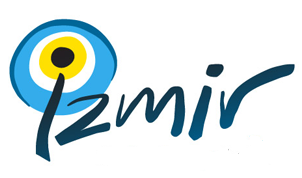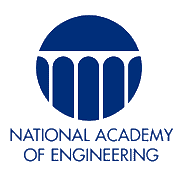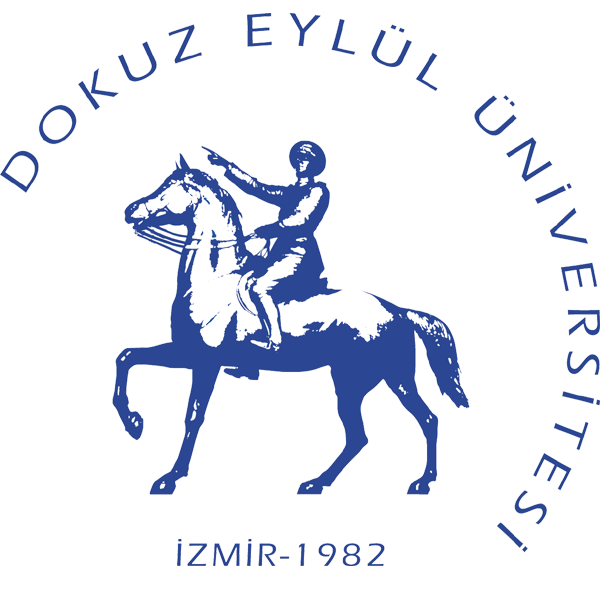Menu
Travel Info:
Participants
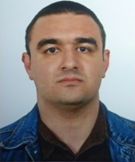
Nikolaos Christodoulou |
Nikolaos Christodoulou is an Electrical and Computer Engineer that holds a Diploma of Engineering from the National Technical University of Athens (NTUA). He is an NTUA PhD candidate and an Assistant Researcher of the In Silico Oncology and In Silico Medicine group of Institute of Communication and Computer Systems (ICCS - NTUA) since 2013. He has participated in the EU funded projects MyHealthAvatar, CHIC and P-Medicine, working in technical tasks involving software designing and developing. His research interests include Software Engineering, Databases and Semantic Web Technologies. |
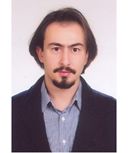
Emre Eskicioglu |
Emre Eskicioglu is a Ph.D. student and research assistant of Biophysics Department in Dokuz Eylul University Medical Faculty. He received his B.S. in physics department of Izmir Institute of Technology (IZTECH) in 2011 and M.Sc. in Dokuz Eylul University Department of Audiology in 2014. His master thesis topic was "Assessments of Auditory Evoked Cortical Potentials in Normal Hearing and Cochlear Implanted Children Between Age 0 and 6". His research areas are evoked and event-related potentials, applied brain biophysics, auditory and neurodegenerative diseases. |
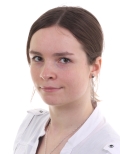
Marta Galinska |
Marta Galinska was born in Krosno in 1991 and has been studying biomedical engineering since 2010. She recently graduated from the Silesian University of Technology, Faculty of Biomedical Engineering in 2015. Her field of study includes IT and medical equipment. She is interested in biocybernetic, navigation in surgery and image processing. Her work includes segmentation of medical images using swarm intelligence and fetal weight estimation using artificial neural networks. During studies she had apprenticeship in Cancer Centre in Gliwice. Now she is a Ph.D. Student and working as assistant in a project related to navigation in breast biopsy. |
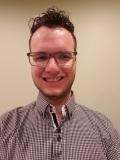
Mark Gotthelf |
Mark Gotthelf is a student at Marquette University in Milwaukee, Wisconsin, where he is completing a BS in Biomedical Engineering with a double major in Biomechanics and Mathematics. As part of the Biomedical Engineer Society he lead a two night talk on 3D Organ Printing and Biocompatibility. He is in the development stages for a research project in parallel processing computing using microcomputers and enjoys completes projects using the Arduino environment to gain a deeper understanding of how electronics function. He also has interests in the mathematical models of cancer/chemotherapy and hopes to one day work on a visualization of this. |
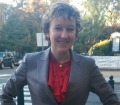
Julie Griep |
Julie Griep was born and raised in the Twin Cities, MN, before moving to Milwaukee, WI to pursue a degree in Biomedical Engineering at Marquette University where she is now a senior. She participates in Marquette's Co-Op program, where she works full time at Fresenius Kabi, a blood technologies company in Illinois. There she is a member of the Research and Advanced Technologies team and works on multiple projects that include 3D printing, cell washing, cryopreservation, immunotherapy and project management. On campus, she performs research with Dr. Lars Olson on the Human Powered Nebulizer, which supplies communities in developing countries with the means to administer medicine without the use of electricity, and she has travelled to Guatemala to administer these medical devices. She is the Vice President of her university's chapter of Alpha Eta Mu Beta, the biomedical engineering honor society, and is a member of the honors program and the first cohort of Engineers in the Lead at Marquette. Outside of work, she participates in the engineering sorority Alpha Omega Epsilon, and enjoys travelling the world. |
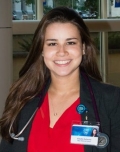
Claudia Gutierrez |
Claudia Gutierrez is a second year medical student at the Mayo Clinic's School of Medicine in Rochester, Minnesota. She is interested a surgical subspecialty and is a leader in her medical school's Association of Women Surgeons (AWS) student chapter. Prior to medical school she completed her bachelor and master degree in biomedical engineering at Drexel University in Philadelphia, Pennsylvania. Her proudest accomplishment at Drexel was serving as president of the school's Society of Women Engineers (SWE) student chapter. She has interned in the medical device industry, venture capital, and conducted research in Switzerland as a Whitaker Undergraduate Scholar. Her academic passions include regenerative medicine, sexual health education, and supporting underrepresented minorities in STEM fields. In her free time she can be found salsa dancing, practicing her French, or grabbing coffee with friends. |
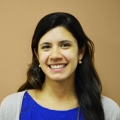
Gabriela Hernandez-Meza |
Gabriela Hernandez-Meza is originally from Caracas-Venezuela. She received her bachelor's degree in Bioengineering from the Pennsylvania State University. Afterwards she joined a medical device start-up company where her meaningful contributions resulted in devices that are improving patient care in the clinical setting. Currently she is a Biomedical Engineering PhD candidate at Drexel University (Philadelphia, PA). She is interested in exploring the use of data obtained from non-invasive sensors to improve human performance assessment and clinical monitoring. Her focus is on the use of machine learning algorithms to examine information from multiple sensors and derive meaningful outcomes that can guide decision making. Her recent work involves the investigation of optical neuroimaging techniques for the evaluation of anesthetic effects on the brain and for the assessment of expertise development in flight simulators. |
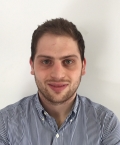
Generoso Ianniciello |
Generoso Ianniciello is an enthusiastic Master student in Health Human Biology at the University of L'Aquila, Italy. Actually, he is working in the Bone Biophatology Lab headed by prof Anna Teti where he his getting experience in the generation of in vitro, ex vivo and in vivo model of genetic rare and common diseases of bone to find out new mechanisms and potential therapeutic targets. After his BSc in Biological Sciences in 2015 at University of L'Aquila ,Italy, he spent 5 months in Aberdeen, Scotland, working on the synthetic biology of the budding yeast Saccharomyces cerevisiae in the Saka Lab, Institute of Medical Sciences, University of Aberdeen. He is interested in molecular genetics, cellular pathology and siRNA-based therapies. He strongly believes in the "new era" of molecular medicine , where the biomedical research moves from bench to bedside. When not in the lab, he enjoys his life travelling, playing football (as goalkeeper) and cooking italian cuisine, expecially pizza. |
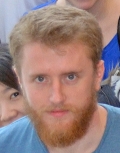
Jason Jones |
Jason Jones is currently pursuing his PhD in Biomedical Engineering at Cornell University in the Nishimura lab. He double majored in Physics and Mathematics at Kutztown University of Pennsylvania during his undergraduate studies. His current research is focused on developing a multimodal imaging system which advances the imaging depth and speed at which intravital microscopy can be performed in mice. He is interested in using this technology to better understand the cellular pathophysiology surrounding injury in the heart using in vivo animal models. When Jason is not in the lab he also enjoys backpacking, snowboarding, restoring motorcycles, kayaking, and teaching outdoor education courses for Cornell. |
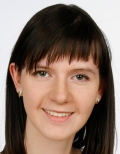
Aleksandra Juraszczyk |
Aleksandra Juraszczyk was born on 3 October 1991 in Chorzow. In January 2014, she graduated from the first degree at the Faculty of Biomedical Engineering she obtained the title of Engineer. She studied IT and medical equipment. In July 2015 she graduated from the secondary degree at the Faculty of Biomedical Engineering, she obtained the title of M.Sc. She studied Computer Science in Medicine. She is currently a PhD student of Silesian University of Technology in the discipline Biocybernetics and Biomedical Engineering and she is working as assistant on navigation in minimally invasive surgery, especially in breast biopsy. During studies she had four internships. In September 2012 and September 2013 in she worked in the department of Medical Equipment in Hospital. In November 2013 she worked as a X-ray technician in the Research Laboratory X-ray. From December 2013 to June 2015 she had an internship in the Department of Diagnostic PET/CT Center of Oncology - Maria Sklodowska-Curie Memorial Institute, Branch in Gliwice. During the internship, she created the software for image analysis and she performed daily and monthly quality control tests Camera PET/CT. |
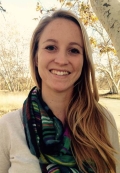
Katrina Kalantar |
Katrina Kalantar is currently a first-year PhD student at the University of California Berkeley UCSF Joint Program in Bioengineering in the DeRisi Lab. She has a strong interest in computation and the development of efficient algorithms for analysis and visualization of large-scale sequencing data. She completed her undergraduate degree in Computer Science with a specialization in Bioinformatics at the University of California, San Diego in 2014. During her undergraduate career she conducted research at both the Joint Genome Institute and the Scripps Research Institute. After graduation, she spent one year working in industry at Illumina, a next-generation sequencing company headquartered in San Diego, as part of the software team in the Oncology group. Her current research involves the analysis of single cell RNA-sequencing data for applications in understanding infectious disease and host-pathogen interactions. Outside of lab, Katrina also enjoys all things outdoors and playing ultimate frisbee. |
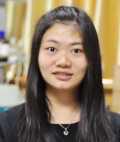
Moxiao Li |
Moxiao Li is a first-year Ph.D. candidate of School of Aerospace in Xi'an Jiaotong University, majoring in Soft Materials and Biomechanics. She has done research under the supervision of Prof. Feng Xu and Prof. Tianjian Lu in Bioinspired Engineering and Biomechanics Center (BEBC) since 2013. During her stay in BEBC, she has established finite element models to get strain/stress distribution inside non-contact and magnetically-actuated loading hydrogel arrays, providing guidance for functional tissue constructs. And inspired by capillary origami phenomenon, she also developed a facile method to fabricate complex 3D hydrogel constructs. Her future research interests will carry on her previous work on biomechanics in cell microenvironment and surface tension/capillary force in bio-fabrication. In addition to the scientific interests, she takes part in a lot of volunteer work as her second passion. And she also enjoys her life with sports (especially soccer), painting and reading. |
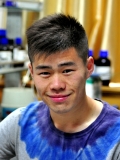
Hao Liu |
Hao Liu is currently a first-year PhD candidate of Biomedical Engineering at Xi'an Jiaotong University, China. His research interests range from flexible electronics for wearable biomedical signal monitoring to bio-mimicking soft robotics for targeted drug delivery. This is his third year in Bio-inspired Engineering and Biomechanics Center (BEBC) where he obtains the supervision of Prof. Feng Xu and the full support from staffs and peer students around. Thanks to such kindness, he has completed several stunning research programs as a leading or collaborating role and transformed some of the achievements to SciTech contest prizes and academic publications in world-renown journals including Advanced Functional Materials and Scientific Reports till now, and he was therefore awarded the National Scholarship of China in 2015. Apart from enthusiasm in science, technology and research, he is also a sports maniac, particularly for football and basketball. Additionally, he is fond of singing and is believed to be a decent singer. |
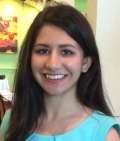
Marjan Majid |
Marjan Majid is a third-year student at the University of Texas at Austin. She is studying biomedical engineering with a focus on cellular and biomolecular engineering. She performs research in the Laboratory for Cardiovascular Bioengineering and Therapeutics with Dr. Aaron Baker where they have recently completed a project studying how the addition of a membrane-embedded co-factor to a growth factor can increase the rate of healing in the diabetic diseased state. Currently, they are working on creating nanodiscs as therapeutic carriers for receptors and membrane bound cytokines. In addition to academia and research she is a very active member of the UT BME community. She is the president of the UT Biomedical Engineering Society, the head of the UT BME Undergraduate Advisory Board, and a Student Associate for the BME Academic Advising Office. She also enjoys STEM Outreach volunteering to inspire younger students to grow their interest in the fields of science and engineering. |
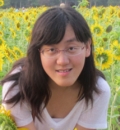
Yamin Mao |
Yamin Mao is a full time PhD graduate student (2013 - 2018) of the Key Laboratory of Molecular Imaging, Chinese Academy of Sciences. Her PhD supervisor is Dr. Jie Tian, fellow of IEEE, SPIE, IAMBE, AIMBE, IAPR. Her current research area is optical image-guided surgery. She has designed a new high-sensitivity fluorescence thoracoscopic system and applied this technology to lung cancers. Her articles have appeared in Scientific Reports and SPIE BiOS. The designed system has obtained gold award of the 8th International Exhibition of Inventions (2014, China) and gold award of the 43rd International Exhibition of Inventions of Geneva (2015, Switzerland). |
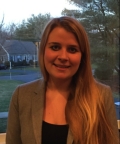
Victorine Muse |
Victorine Muse received her B.S. in Biological Engineering in 2016 from Cornell University, as a Hunter R. Rawlings III Presidential Research Scholar. She was also the recipient of the OSA Paul Anthony Bonenfant award in 2015 that provides funding to study biotechnology abroad, which she completed in Copenhagen during her junior year. She currently is a Masters of Biomedical Engineering candidate at Cornell University, and will graduate in December 2016. Her research at the Schaffer-Nishimura Biomedical Engineering lab at Cornell University focuses on brain blood flow in Alzheimer’s disease. Specifically, she focuses on identifying the mechanics behind increased capillary stalling and decreased blood flow in Alzheimer’s disease mouse models and how to alleviate these effects with the hopes of cognitive improvement. She has also begun work on a project in collaboration with UC Berkeley to develop an online platform to crowdsource data analysis from the Schaffer-Nishimura lab in order to fast track results. In her free time she enjoys traveling, volunteering, participating in sorority functions, and is the President and Captain of the Cornell Women’s Club Ice Hockey team. |

Kathryn Nielsen-Mossman |
Kathryn Nielsen-Mossman is a recent graduate of the Biomedical Engineering undergraduate program at the University of Houston in Houston, Texas, where she is currently working as a technical assistant for the Biomedical Engineering department. She has had a passion for engineering and medicine since her early childhood, and greatly enjoys using a combination of the two to develop solutions to challenges in global health care. She is also involved in developing a device for assessing motor function in patients with various levels of paralysis, in collaboration with Houston Methodist Neurological Institute. When outside of the lab, Kathryn enjoys spending time with her husband and keeping up with their 18-month old daughter. |
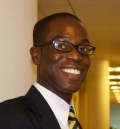
Daryl Omire-Mayor |
Daryl Omire-Mayor is currently a 5th year Biomedical Science PhD Candidate at Drexel University. He works in the lab of Dr. Kambiz Pourrezaei as a part of the Cognitive Neuroengineering and Quantitative Experimental Research Collaborative group where the focus is on development and implementation of brain imaging modalities. His thesis merges his scientific research on objectively measuring the autonomic response to pain with clinical trials on human subjects and has practical applications. Current research interests include using functional near infrared spectroscopy (fNIRS) to monitor the brain’s response to pain induction, coupled with multiple psychological parameters – combining the objective measure of pain detection and the subjective measure of pain perception. fNIRS brain imaging technology provides a measure of brain activity through hemodynamic responses associated with neuronal behavior. Presently, no cost-effective quantitative tool exists to measure the level of pain and practitioners depend solely on patients’ perceptions; development of this non-invasive, quantitative tool will allow for more effective treatment. Upon completion of his PhD, he plans to continue his pursuit of becoming a physician scientist by going on to medical school. |
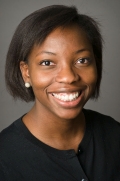
Lindsey Osimiri |
Lindsey Osimiri is a first-year student in the El-Samad Lab studying to complete a Ph.D at the University of California, Berkeley - University of California, San Francisco Joint Program in Bioengineering. She is specifically interested in using machine learning and optogenetics to predict and understand the behavior of complex biological systems, like transcription, in yeast for metabolic engineering applications. Previously, Lindsey earned a B.S. in Biological Engineering from MIT. During her undergraduate education, she conducted research in several laboratories, including Prof. Lauffenburger's lab at MIT. After graduation, she worked for a year at Selventa, a systems biology consulting company, as a Computational Biology Research Associate. When she is not at the bench or the terminal, she enjoys cooking and photography. |

Marta Overchuk |
Marta Overchuk was born and raised in Lviv, Ukraine. In 2014 she obtained a hon. BSc degree in biochemistry from the Ivan Franko National University of Lviv. Currently she is in her second year of MASc program at the Institute of Biomaterials and Biomedical Engineering working under the supervision of Prof. Gang Zheng. While being an undergraduate student Marta obtained a broad research experience in the areas of cell biology, drug delivery and bio-nano interactions. Her present research focuses on the development of biomimetic nanoplatform for multimodal cancer imaging and targeted delivery of therapeutic agents, such as photosensitizers. Having a strong interest in the translational research, she is committed to pursue a medical degree after finishing her graduate studies. Additionally, Marta is an executive member of the Beyond Sciences Initiative - a non-profit student association that provides a platform for intercultural dialogue between like-minded scholars around the world through bilateral mentorship and online educational resources. Outside of work, Marta enjoys volunteering at the Princess Margaret Cancer Center, travelling and exploring Toronto Symphony Orchestras repertoire. |
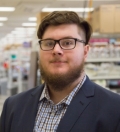
Nathaniel Z. Piety |
Nathaniel Z. Piety graduated from Tulane University (New Orleans, LA) in 2013 with a B.S.E. in biomedical engineering, B.S. in mathematics and B.A. in anthropology as well as a minor in business. He is currently pursuing a Ph.D. in biomedical engineering at the University of Houston (Houston, TX) under advisor Dr. Sergey S. Shevkoplyas, Ph.D., with a focus on blood microfluidics. Specifically, his research utilizes custom microfluidic devices to study the morphology, rheology and mechanical properties of stored red blood cells, with the goal of improving the safety and efficacy of blood transfusion. Additionally, Nathaniel's research involves the development of ultra-low-cost, electricity and equipment-free, point-of-care diagnostic devices based on the formation of blood stains on microporous substrates. His career goals include becoming an independent researcher, professor and entrepreneur, with a focus on translational research and biomedical product development. He aspires to translate clinically focused biomedical research from the benchtop to the bedside, particularly in the developing world. |
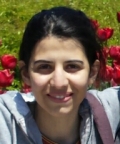
Helia Safaee |
Helia Safaee is a fourth-year undergraduate student, studying Chemical Engineering at the University of Toronto. She has done her undergraduate thesis research under the supervision of Dr. Penney Gilbert, at the Institute of Biomaterials and Biomedical Engineering in the area of muscle stem cell bioengineering. She has also been an NSERC recipient for summer research, and a research intern at the Harvard-MIT Division of Health Sciences & Technology. Her previous research experiences include developing novel biomaterials for improving drug bioavailability, and modifying mesenchymal stem cells in order to enhance their therapeutic and targeting capabilities for cancer and immune-inflammatory disorders. She is interested in learning more about the various ways engineering techniques can be combined with cellular system biology, in order to help develop translational technologies for stem cell-based therapeutics. Outside of research, she really enjoys running, and painting. |
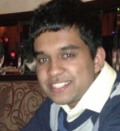
Dhruv Seshadri |
Dhruv Seshadri is pursuing his Masters (M.S.) in Biomedical Engineering at Case Western Reserve University. His thesis work, currently at the Cleveland Clinic Lerner Research Institute, is on developing drug-laden nanoparticles as a nano- pharmacological approach for Non-Small-Cell Lung Cancer. He graduated with his Bachelors (B.S.) in Polymers Science and Engineering from Case Western in 2014. His undergraduate thesis work involved the electrostatic spinning and characterization of nanofibers for drug delivery. Dhruv interned at Atomic Energy and Alternative Energies Commission in Grenoble, France (2014, National Science Foundation Fellowship) and Lawrence Berkeley National Laboratory, Berkeley, USA (2012, 2013 U.S. DOE Fellowship). In 2011, Dhruv interned at Dr. Reddy's and Bharat Biotech, in Hyderabad, India. He has 10 posters and papers to his credit, including a poster award from the American Ceramic Society. Dhruv's technical and career interest lies in the development, utilization, and commercialization of biomedical technology for clinical applications. |
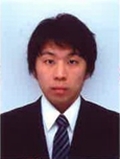
Yoshinori Sunaga |
Yoshinori Sunaga received the B.E. degree in Department of Medical System Engineering from Chiba University, Japan, in 2012, and received M.E. degree in Graduate School of Materials Science from Nara Institute of Science and Technology, Japan, in 2014. He is currently working on development of an implantable imaging device for fluorescence imaging in mice brain toward the Ph.D. degree at Nara Institute of Science and Technology. |

Aubrey Swilling |
Aubrey Swilling. Born and raised in Central Texas, Aubrey moved to Houston in 2012 to further her education as a Tier One Scholar at the University of Houston. She is a senior undergraduate student studying Biomedical Engineering, and wants to pursue a career as a physician. During her undergraduate career, Aubrey has conducted research for the Biomedical Engineering Department, focusing on identifying biomarkers for autoimmune diseases to be used as noninvasive diagnostic or prognostic tools as well as novel therapeutic targets. Aubrey has also worked as a TA for the University, teaching ordinary differential equations and calculus. Outside of school, Aubrey works as a tutor for students from elementary to high school. In her free time, Aubrey was an active member of her sorority for women in Engineering and Engineering Technology, Phi Sigma Rho. She was vice president for two years and held numerous other leadership positions. She also was a member of the University of Houston's Women's Club Volleyball team and enjoys working out, frequenting coffee shops, and spending time with her friends and family. |
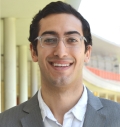
Kian A. Torabian |
Kian Torabian is a PhD candidate in The Department of Biomedical Engineering at The University of Houston. He earned his BS in bioengineering, with a minor is computer science, from Stanford University in 2013, where his research focused on the biophysical modeling of cell morphology and deformability in high pressure environments for applications in bioreactor design and biofilm formation. His graduate thesis work on mammalian red blood cell deformability aims to improve accessibility to medical care for sickle cell patients by developing low-cost, microfluidic devices for companion diagnostics and cellular therapies. He has broad experience ranging from digital image processing for mobile health app development, to microfluidic design and cell biochemistry for analysis of cellular quality. Kian, a recent STEM Chateaubriand Fellow, will conduct a collaborative project between The University of Houston and l'Universite de Lyon to design a device that can accurately indicate the severity of sickle cell disease in real-time in order to prevent vaso-occlusive crises. |

Jingwei Wei |
Jingwei Wei is a full time PhD graduate student (2014 - 2019) of the Key Laboratory of Molecular Imaging, Chinese Academy of Sciences. Her PhD supervisor is Dr. Jie Tian, fellow of IEEE, SPIE, IAMBE, AIMBE and IAPR. Her current research area is Radiomics. Based on the radiomics approach, she fulfilled the prediction on the genotype of Oligodendroglial patients with favorable prediction accuracy. She also contributed to the non-small cell lung cancer research using the convolutional neural network for predicting molecular profiles. |
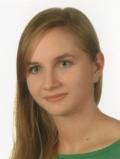
Agata M. Wijata |
Agata M. Wijata received her B.Sc. and M.Sc. degrees in Biomedical Engineering from Silesian University of Technology in 2014 and 2015, respectively. Master's thesis concerned the multisensory perception of information in a context of sound interfere with visual perception. She is currently a Ph.D. student of Biocybernetic and Biomedical Engineering. She is doing her research at Faculty of Biomedical Engineering (Department of Informatics and Medical Equipment) The main topic of her interest is music impact on psychophysiological human condition, behavioural biometrics and navigation in breast biopsy. |

Michal Wojtyla |
Michal Wojtyla is a student of first year M.Sc. Faculty of Biomedical Engineering, Department of Biosensors and Biomedical Signal Processing at the Silesian University of Technology in Zabrze, Poland. Graduated B.Sc. in Biomedical Engineering in this year. My adventure with electronics began in electronic-profile High School. During my B.Sc. I started to be interested in software development and programming (especially for medical applications), biomedical devices and biomedical signal processing. Currently (after classes at the Faculty) I am working as mobile devices programmer. My free time is mainly spent on application development and assembling small monitoring systems (for health parameters monitoring too) based on Arduino facilities. |

